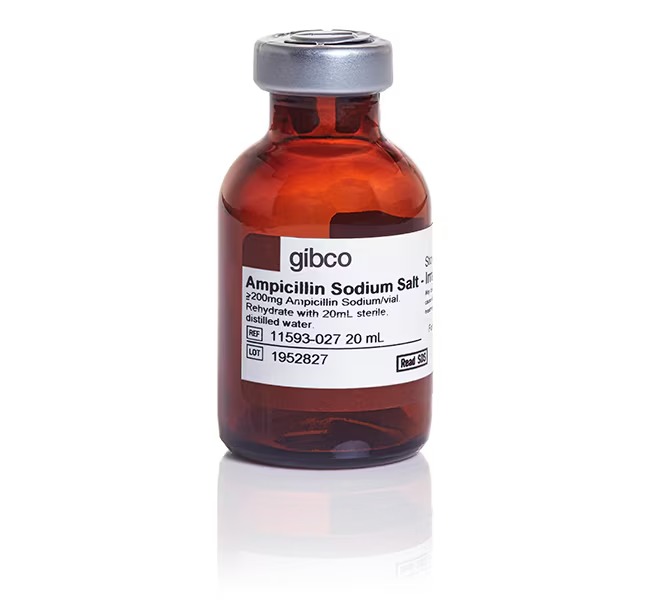Gibco™ Ampicillin, sodium salt, irradiated, 200 mg
Catalog No :
CAS Number :
Brand :
In Stock
Specifications:
| Application | Cell culture | ||
| Storage Temperature | 2-8°C | ||
| Product Type | Antibiotic | Forms | Solid |
| Product Brand | Thermo Fisher Scientific™, Gibco | ||
| Product Grade | Cell Culture | ||
Gibco™ Ampicillin, Sodium Salt, Irradiated is an antibiotic in the broad-spectrum penicillin group, commonly used in bacterial selection for research applications. It is effective against a wide range of gram-positive and gram-negative bacteria due to its ability to inhibit bacterial cell wall synthesis. The irradiated form of ampicillin helps maintain its effectiveness and purity for laboratory use.
Ampicillin differs from penicillin by the presence of an amino group, which facilitates its penetration through the outer membrane of certain gram-negative bacteria, making it an essential tool for selective antibiotic applications. It is widely used in molecular biology for the selection of transformed bacterial cells and the maintenance of plasmid constructs.
Key Features & Benefits:
-
Broad-Spectrum Activity:
- Ampicillin is effective against a wide variety of bacterial infections, both gram-positive and gram-negative, making it versatile for antibiotic selection in molecular cloning and other bacterial culture applications.
-
Selective Antibiotic for Molecular Biology:
- It is primarily used for selecting bacteria that have been transformed with a plasmid that carries an ampicillin resistance gene (bla), ensuring that only successfully transformed cells grow in culture.
-
Resistance Mechanism:
- Ampicillin works by interfering with bacterial cell wall turnover and triggering the release of enzymes that further degrade the bacterial cell wall. However, some bacteria express beta-lactamase enzymes, which can degrade ampicillin. In such cases, fresh ampicillin may need to be added to halt bacterial growth and prevent satellite colony formation.
-
Convenient Powder Form:
- The product is supplied as a powder, which can be easily prepared into a stock solution at a concentration of 10 mg/mL in water. This allows for custom concentrations based on experimental needs.
-
Manufactured in cGMP-Compliant Facility:
- Gibco Ampicillin is produced in a cGMP-compliant facility, ensuring consistent quality and reliability for research use. The facility is certified to ISO 13485 standards and registered with the FDA as a medical device manufacturer.
-
Shelf Life:
- The product has a shelf life of 24 months from the date of manufacture when stored properly.
Applications:
- Bacterial Selection: Gibco Ampicillin is used for selective antibiotic resistance in bacterial cultures, particularly when working with transformed cells containing an ampicillin resistance gene.
- Plasmid Maintenance: Used in laboratory experiments to maintain plasmid constructs and select for transformed bacterial strains.
- Molecular Cloning: Essential for cloning experiments involving plasmid vectors, where antibiotic resistance is used to select for successfully transformed bacteria.
- Gene Expression: Applied in studies that require the maintenance of plasmids with ampicillin resistance for the expression of recombinant proteins.
Specifications:
| Feature | Details |
|---|---|
| Concentration | 20 to 125 μg/mL |
| Form | Powder |
| Product Type | Antibiotic |
| Shelf Life | 24 Months |
| For Use With (Application) | Bacterial selection, cloning, plasmid maintenance |
| Quantity | 200 mg |
| Shipping Condition | Room Temperature |
| Storage Conditions | 2 to 8°C |
| Unit Size | Each |
Storage:
- Store at 2 to 8°C to maintain the stability and effectiveness of the antibiotic.
- Shipping: The product can be shipped at ambient temperature.
Important Notes:
- Beta-lactamase activity: In some cases, beta-lactamase produced by the bacteria can degrade ampicillin in culture media, leading to satellite colony formation. To counter this, ensure that fresh ampicillin is added to the media or consider using a beta-lactamase-resistant version.
- Electroporation Consideration: Prior to electroporation, it is necessary to inactivate ampicillin by chloroform extraction or spin column purification to prevent inhibition during transformation processes.
The Thermo Scientific™ Ampicillin, Sodium Salt, Irradiated is a high-quality antibiotic used in molecular biology for DNA cloning, bacterial selection, and plasmid maintenance. Its broad-spectrum activity, ease of use, and proven effectiveness make it an indispensable tool for researchers involved in genetic manipulation and molecular research.




 0
0
